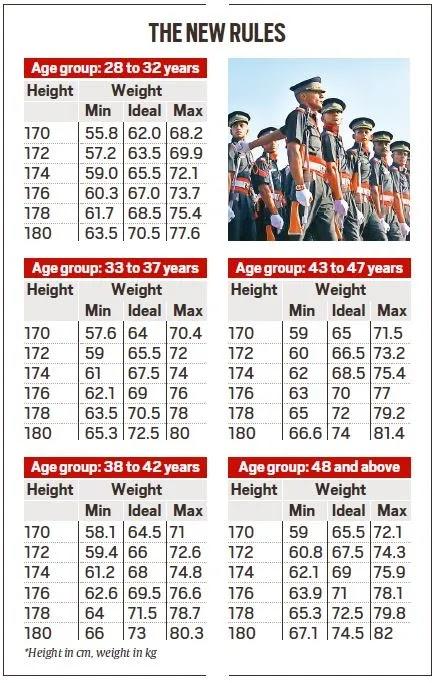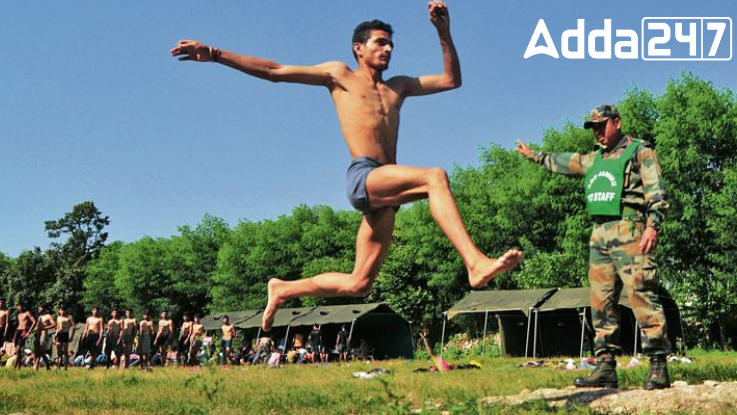In response to concerns over declining physical standards and the increasing prevalence of lifestyle diseases within the Indian Army, a comprehensive new policy has been implemented. This policy aims to bolster physical health and ensure uniformity in assessments across the force.
Introduction of Stringent Measures
The new policy introduces stringent measures for addressing physical health concerns among personnel, particularly overweight individuals. It mandates prompt action if no improvement is observed within 30 days. Additionally, it introduces the Army Physical Fitness Assessment card (APAC), a standardized tool for monitoring and maintaining physical fitness levels.
Current Physical Fitness Assessment Standards in the Indian Army
Current standards include quarterly BPET and PPT assessments, encompassing diverse physical tasks. The BPET entails a 5 km run, 60-meter sprint, horizontal and vertical rope climbs, and a 9 feet ditch traverse within age-based time limits. Similarly, the Physical Proficiency Test comprises a 2.4 km run, 5 m shuttle, push-ups, chin-ups, sit-ups, and a 100-meter sprint. The swimming evaluation is administered where facilities permit.

Oversight by Senior Officials
A significant change in the implementation process is the involvement of senior officials, primarily Brigadier officers, who now oversee assessments. This change aims to streamline procedures and ensure consistent evaluation standards.
Focus on Physical Health
The primary objective of this policy is to address concerns regarding physical health within the Indian Army. It emphasizes the importance of maintaining physical standards during courses, foreign postings, and in combating lifestyle diseases.
Rigorous Assessment Criteria
The policy outlines rigorous assessment criteria, including the Battle Physical Efficiency Test (BPET) and the Physical Proficiency Test (PPT). These tests evaluate various physical abilities, such as endurance, strength, and agility, to ensure optimal readiness among personnel.
New Additions to Assessments
To enhance assessment standards further, new tests such as the swimming proficiency exam, 10 km speed march, and 32 km route march have been introduced. These tests supplement the existing quarterly assessments, providing a comprehensive evaluation of physical fitness.
Integration with Performance Evaluation
The results of these assessments will be integrated into the Annual Confidential Report (ACR) of officers, ensuring that physical health is considered a key component of overall performance evaluation.
Accountability and Compliance
Every officer is required to possess an Army Physical Fitness Assessment Card and submit test results within 24 hours. Non-compliance with weight standards will result in written counseling and directions for weight reduction, with a grace period of 30 days provided for improvement.
Enhancing Physical Standards: Indian Army’s Commitment
The implementation of this new policy underscores the Indian Army’s commitment to optimizing physical standards and promoting overall health among its personnel. By introducing standardized assessments and stringent measures, the Army aims to foster a culture of physical fitness and readiness across its ranks.
Important Questions Related to Exams
1 What is the primary aim of the new policy implemented in the Indian Army?
2. What is the timeframe given for improvement if no progress is seen in overweight personnel?
3. Which test is part of the quarterly physical activity testing introduced by the new policy?
Kindly share your responses in the comment section!!



 GRSE's Seventh ASW Ship, ‘Abhay’, Jo...
GRSE's Seventh ASW Ship, ‘Abhay’, Jo...
 Chanakya Defence Dialogue 2024 Culminate...
Chanakya Defence Dialogue 2024 Culminate...
 India-Germany Maritime Partnership Exerc...
India-Germany Maritime Partnership Exerc...

